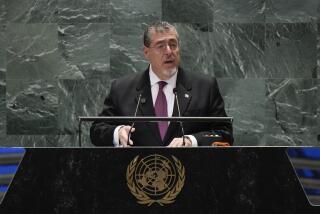Human Rights Official Picked to Lead Guatemala
- Share via
GUATEMALA CITY — Human rights ombudsman Ramiro de Leon Carpio was selected president of Guatemala late Saturday, putting an end to the political crisis that has gripped this country but raising questions about whether the military will accept the choice.
De Leon, a respected attorney who as a defender of human rights frequently incurred the wrath of the Guatemalan government and army, was designated president by Congress in a second round of voting. He was to be sworn in early today.
“Our first challenge is to emerge from the abyss where we have been the last few days,” De Leon said. “We must build a new way, without revenge and revanchism.”
De Leon is to serve until Jan. 14, 1996, finishing the term left by former President Jorge Serrano. Serrano was ousted in a military coup Tuesday, a week after he had staged his own coup by suspending the constitution and plunging this country into political chaos.
Congress convened late Saturday afternoon to choose the president from a list of men drawn up by a broad and powerful coalition of business executives, politicians, labor leaders and others. The coalition formed to find a way to restore Guatemala to constitutional rule.
De Leon failed to achieve the required two-thirds majority in the first round of voting. His opponent, Supreme Electoral Tribunal President Arturo Herbruger Asturias, then withdrew his name from consideration, clearing the way for De Leon’s victory. In the second round, De Leon received 106 votes.
To vote, members of the 116-member Congress wrote the name of their preferred candidate on unsigned slips of paper that were then collected in large silver urns and counted by hand.
The selection process began after Vice President Gustavo Espina Salguero abandoned his efforts to replace Serrano. Espina’s attempt to occupy the presidency was opposed by many who considered his potential government a front for the military.
A frequent critic of the Serrano presidency, De Leon, 50, has denounced murders by government security forces and championed press freedoms. Serrano suspended him from his human rights post when he seized absolute power May 25, dissolving Congress and the Supreme Court.
Espina stepped aside after opposition to his presidency became insurmountable. The highest court in the country ruled him ineligible, the business and political elite demanded he resign, and street demonstrations called for him to be prosecuted. Finally, the army withdrew its support.
Espina resigned in a meeting with Defense Minister Jose Domingo Garcia Samayoa at the general’s home Friday evening.
“He was asked to take the most correct path,” Garcia Samayoa said of Espina. “He allowed himself to be counseled and he listened very well . . . “
Espina had declared himself president Wednesday, arguing that he was the constitutionally established successor to the president. But the Constitutional Court ruled that Espina was an accomplice to Serrano’s illegal usurpation of powers.
Emerging most battered from the political drama here may be the Guatemalan army, which threw its support behind Serrano, then withdrew it, then threw its support behind Espina and then once again withdrew it.
The events drove a wedge in the army, according to politicians and diplomats. The intelligence division and some of the regional commanders were said to have opposed the High Command’s support for Serrano and then Espina.
In what appeared to be a punishment, seven army intelligence officials have been removed from their posts. Gen. Mario Enriquez, deputy chief of staff for the army and a member of the High Command, on Saturday confirmed the changes, which were officially described as “routine.”
Garcia Samayoa said the army approved of the selection process for the next president.
The political-business coalition, which calls itself the National Consensus group, could not agree on a single candidate and instead submitted three names to the Congress. In addition to De Leon and Herbruger, the list included Mario Quinonez Amezquita, foreign minister in the government of President Vinicio Cerezo Arevalo, who was Serrano’s predecessor.
In the congressional debate, however, Quinonez Amezquita was not placed into nomination.
De Leon seems the most popular choice among Guatemalan citizens, but there have been serious questions about whether the military would back him because of his work in human rights. Most of the violators in this country’s long, dark history of brutal atrocities have been members of government security forces.
De Leon told reporters earlier Saturday that he had received assurances from the military that they would not veto his presidency.
“We are facing a moment of social explosion, and there must be a solution,” he said, but he cautioned: “Do not think a new president will be a savior. Many problems have existed here for years, and they are not going to be solved quickly.”
More to Read
Sign up for Essential California
The most important California stories and recommendations in your inbox every morning.
You may occasionally receive promotional content from the Los Angeles Times.











